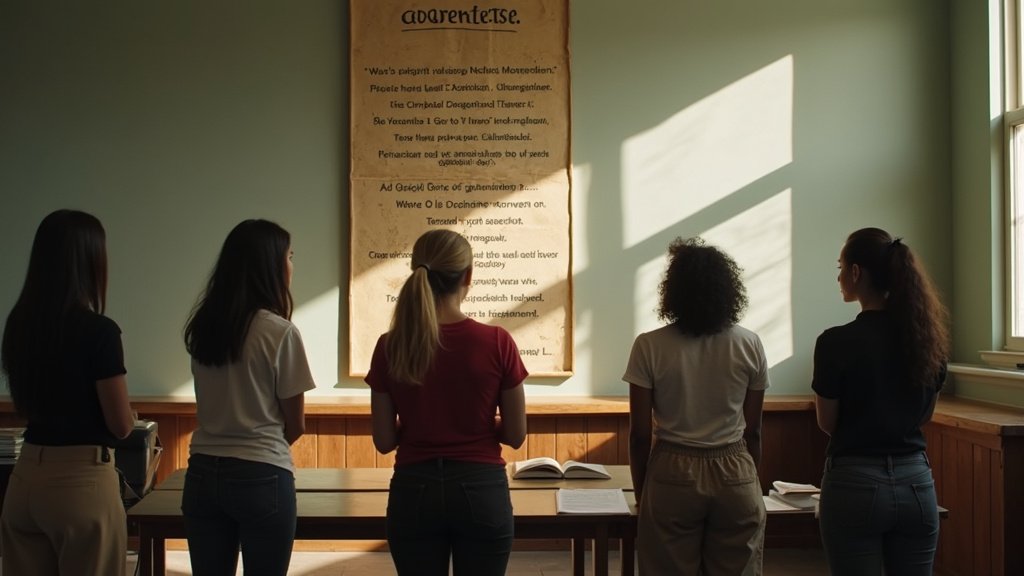Texas Mandate for Ten Commandments in Classrooms Ignites Legal Battles and Subtle Teacher Resistance
A new state law in Texas, Senate Bill 10 (SB 10), requiring the display of the Ten Commandments in every public school classroom, has ignited a fierce debate and a wave of legal challenges. The mandate, which went into effect on September 1, 2025, has also spurred a quiet but creative resistance among some educators and families, highlighting the ongoing tension between religious expression and the separation of church and state in public education. This current news is generating significant buzz across the state.
The Legislative Push Behind SB 10
Senate Bill 10, authored by Republican Senator Phil King, was passed by the Texas Legislature along party lines and signed into law by Governor Greg Abbott on June 21, 2025. Proponents, including Attorney General Ken Paxton, argue that the Ten Commandments are foundational to America’s legal, moral, and historical heritage. Supporters believe displaying them in schools will help restore moral clarity. The law mandates that schools display a donated poster or framed copy of the Ten Commandments, measuring at least 16 by 20 inches, in a conspicuous place in each classroom. The text must be legible and cannot include any additional commentary or imagery. This initiative mirrors similar laws passed in other conservative-led states, such as Louisiana, which have also faced significant legal opposition.
Legal Challenges Mount Against the Mandate
Almost immediately after the law’s passage, a coalition of sixteen families, representing diverse religious and nonreligious backgrounds—including Jewish, Christian, Unitarian Universalist, Hindu, and nonreligious individuals—filed a federal lawsuit challenging SB 10. Represented by the American Civil Liberties Union (ACLU) of Texas, the ACLU, Americans United for Separation of Church and State, and the Freedom From Religion Foundation, the plaintiffs argue that the law violates the First Amendment of the U.S. Constitution. Their complaint asserts that the mandate unconstitutionally blurs the line between church and state, infringing upon both the Establishment Clause, which prohibits government endorsement of religion, and the Free Exercise Clause, which protects individuals’ right to practice their faith freely. Plaintiffs also point out that the specific version of the Ten Commandments mandated by the law aligns with a Protestant interpretation, differing from the texts used by other faiths and potentially alienating students from those backgrounds.
Judicial Intervention: A Temporary Block
On August 20, 2025, U.S. District Judge Fred Biery issued a preliminary injunction that temporarily blocked SB 10 from taking full effect in eleven specific school districts named in the lawsuit. Judge Biery concluded that the law likely violates the First Amendment, stating it favors Christianity over other faiths and is not neutral with respect to religion. He expressed concern that the displays could lead to unconstitutional religious coercion of students, interfering with families’ rights to direct their children’s religious education. The ruling, however, only applies to the enjoined districts, affecting over 600,000 students, while the law remains in effect for the rest of Texas.
Attorney General’s Appeal and Divided Reception
Texas Attorney General Ken Paxton immediately appealed Judge Biery’s ruling, calling the separation of church and state a “bogus claim” and vowing to defend the law. Paxton directed all school districts not affected by the injunction to comply with SB 10. The Texas Values organization has been actively distributing donated posters of the Ten Commandments, and supporters believe the law upholds foundational principles. Conversely, critics, including the ACLU, have hailed the injunction as a victory for religious freedom and a reaffirmation that public schools are for education, not evangelism.
Teachers’ ‘Quiet Revolt’ and Parent Reactions
In classrooms across Texas, educators are navigating the controversial law with varied approaches. Some teachers are employing subtle forms of resistance, such as flanking the mandated Ten Commandments posters with information about other religions or ethical systems. One art teacher reportedly balanced the commandments with teachings from Buddhism, Hinduism, and Islam, viewing it as providing context rather than defiance. Others have expressed their discomfort, with some indicating they would rather hang the poster upside down than comply with what they perceive as religious favoritism. Parents have also become actively involved, with some distributing First Amendment pins to students. While many parents support the law, viewing it as a return to core values, others, regardless of their own faith, oppose its imposition in public schools, arguing it violates parental rights and religious freedom.
Ongoing Debate and Future Outlook
The legal battle over SB 10 is far from over, with the case now headed to the U.S. Fifth Circuit Court of Appeals. Legal scholars note that previous Supreme Court rulings, such as Stone v. Graham in 1980, have found similar state laws requiring the display of the Ten Commandments in classrooms to be unconstitutional. The current legal arguments are expected to echo these past decisions, and the matter may ultimately reach the U.S. Supreme Court. This ongoing legal and social debate in Texas underscores the persistent challenges in defining the appropriate role of religion in public life and the complex interpretations of constitutional freedoms.






